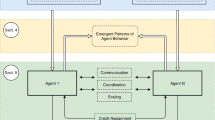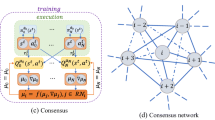Abstract
In this paper, we propose a convergence analysis of evolutionary dynamics with limited learning ability within a double-layer network, exceeding the constraints of current approaches. To model the diversity in the agents’ ability to perceive their surroundings, we first design the dynamics model for continuous action iterated dilemma with limited learning ability. The agents are initialized with a fixed parameter that represents their maximum probability of strategy switching during the evolution process. Secondly, we extend the dynamics model to double-layer networks, in which the agents interact exclusively with neighbors in the same layer and update their strategies based on a weighted sum of their payoff in the two layers. Then, we evaluate the environmental influences on learning capacity using a dynamics formula and adapt to the unknown environment dynamics with radial basis function neural network (RBF-NN). Lastly, we conduct a convergence analysis of the dynamics models and confirm their effectiveness with experiments. This method may be utilized to analyze evolutionary processes in hierarchically structured networks.








Similar content being viewed by others
Data Availability
Data sharing is not applicable to this article as no new data were created or analyzed in this study.
Abbreviations
- \({p_0,p_1,p_2,p_3}\) :
-
The payoff of player
- \({x_i}\) :
-
The strategy of player i
- \({F(x_i)}\) :
-
The fitness of player i
- k :
-
Iteration number
- \({p_{ij}}\) :
-
The strategy switching probability of player i
- G :
-
A complex network
- V :
-
The vertex set of network G
- E :
-
The edge set of network G
- N :
-
The number of players
- \({a_{ij}}\) :
-
Edge weight between vertex i and j
- \({\textrm{deg}(v_{i})}\) :
-
The degree of player i
- x(t):
-
The state of the system at time t
- \({\alpha }\) :
-
The equilibrium point
- \({l_i}\) :
-
The learning ability of player i
- \({f_{i}}\) :
-
The unknown dynamics of player i
- m(t):
-
The weight of high-fitness layer
- \({L_{k}}\) :
-
The Laplacian matrix of graph \(G_k\)
- e :
-
The error between the state x and equilibrium point \(\alpha \)
- X :
-
The strategy of players
- W :
-
Weight vector
- \({\varphi (x)}\) :
-
The Gaussian function
- \({\xi }\) :
-
The fitting error of f
- \({\hat{f}}\) :
-
The approximation of f
- \({\hat{W}}\) :
-
The estimate of the weight matrix W
- \({\tilde{W}^{T}}\) :
-
The estimation error of the weight matrix W
- \({\tilde{f}(x)}\) :
-
The estimation error of function f
- \({\Vert W\Vert _{\textrm{F}}}\) :
-
The Frobenius norm of W
- \(W_{M}\) :
-
The upper bound of W
- \({\Vert \varphi \Vert }\) :
-
The vector norm of \(\varphi \)
- \({\varphi _{M}}\) :
-
The upper bound of \(\varphi \)
References
Apaloo, J., Brown, J.S., Vincent, T.L.: Evolutionary game theory: Ess, convergence stability, and nis. Evol. Ecol. Res. 11(4), 489–515 (2009)
Assenza, S., Gómez-Gardeñes, J., Latora, V.: Enhancement of cooperation in highly clustered scale-free networks. Phys. Rev. E 78(1), 017101 (2008)
Boucek, F.: Rethinking factionalism: typologies, intra-party dynamics and three faces of factionalism. Party Polit. 15(4), 455–485 (2009)
Brandt, H., Hauert, C., Sigmund, K.: Punishment and reputation in spatial public goods games. Proc. R. Soc. Lond. Ser. B Biol. Sci. 270(1519), 1099–1104 (2003)
Cheng, L., Liu, G., Huang, H., Wang, X., Chen, Y., Zhang, J., Meng, A., Yang, R., Yu, T.: Equilibrium analysis of general n-population multi-strategy games for generation-side long-term bidding: an evolutionary game perspective. J. Clean. Prod. 276, 124123 (2020)
Dal Bó, P., Fréchette, G.R.: On the determinants of cooperation in infinitely repeated games: a survey. J. Econ. Lit. 56(1), 60–114 (2018)
Du, W.B., Cao, X.B., Zhao, L., Hu, M.B.: Evolutionary games on scale-free networks with a preferential selection mechanism. Physica A 388(20), 4509–4514 (2009)
Fu, F., Hauert, C., Nowak, M.A., Wang, L.: Reputation-based partner choice promotes cooperation in social networks. Phys. Rev. E 78(2), 026117 (2008)
Fudenberg, D., Maskin, E.: The folk theorem in repeated games with discounting or with incomplete information. In: A long-run collaboration on long-run games, pp. 209–230. World Scientific (2009)
Hammond, R.A., Axelrod, R.: Evolution of contingent altruism when cooperation is expensive. Theor. Popul. Biol. 69(3), 333–338 (2006)
Hill, K.: Altruistic cooperation during foraging by the ache, and the evolved human predisposition to cooperate. Hum. Nat. 13(1), 105–128 (2002)
Hintze, A., Adami, C.: Punishment in public goods games leads to meta-stable phase transitions and hysteresis. Phys. Biol. 12(4), 046005 (2015)
Hofbauer, J., Sigmund, K., et al.: Evolutionary Games and Population Dynamics. Cambridge University Press, Cambridge (1998)
Lacker, D.: On the convergence of closed-loop nash equilibria to the mean field game limit. Ann. Appl. Probab. 30(4), 1693–1761 (2020)
Lewis, F.L., Zhang, H., Hengster-Movric, K., Das, A.: Cooperative Control of Multi-agent Systems: Optimal and Adaptive Design Approaches. Springer, Berlin (2013)
Liu, Y., Chen, X., Zhang, L., Wang, L., Perc, M.: Win-stay-lose-learn promotes cooperation in the spatial prisoner’s dilemma game. PLoS ONE 7(2), e30689 (2012)
Milinski, M., Lüthi, J.H., Eggler, R., Parker, G.A.: Cooperation under predation risk: experiments on costs and benefits. Proc. R. Soc. Lond. Ser. B Biol. Sci. 264(1383), 831–837 (1997)
Nakamaru, M., Iwasa, Y.: The coevolution of altruism and punishment: role of the selfish punisher. J. Theor. Biol. 240(3), 475–488 (2006)
Nowak, M.A.: Five rules for the evolution of cooperation. Science 314(5805), 1560–1563 (2006)
Nowak, M.A., May, R.M.: Evolutionary games and spatial chaos. Nature 359(6398), 826–829 (1992)
Ploderer, B., Reitberger, W., Oinas-Kukkonen, H., van Gemert-Pijnen, J.: Social interaction and reflection for behaviour change. Pers. Ubiquitous Comput. 18, 1667–1676 (2014)
Poncela, J., Gómez-Gardeñes, J., Traulsen, A., Moreno, Y.: Evolutionary game dynamics in a growing structured population. New J. Phys. 11(8), 083031 (2009)
Prandi, L., Primiero, G.: Effects of misinformation diffusion during a pandemic. Appl. Netw. Sci. 5(1), 1–20 (2020)
Sandholm, W.H.: Evolutionary Game Theory. Complex Social and Behavioral Systems: Game Theory and Agent-Based Models pp. 573–608 (2020)
Santos, F.C., Santos, M.D., Pacheco, J.M.: Social diversity promotes the emergence of cooperation in public goods games. Nature 454(7201), 213–216 (2008)
Sastry, S., Sastry, S.: Lyapunov stability theory. Nonlinear Syst. Anal. Stab. Control pp. 182–234 (1999)
Smith, J.M.: The theory of games and the evolution of animal conflicts. J. Theor. Biol. 47(1), 209–221 (1974)
Stefanone, M.A., Vollmer, M., Covert, J.M.: In news we trust? Examining credibility and sharing behaviors of fake news. In: Proceedings of the 10th International Conference on Social Media and Society, pp. 136–147 (2019)
Su, Q., McAvoy, A., Plotkin, J.B.: Evolution of cooperation with contextualized behavior. Sci. Adv. 8(6), eabm6066 (2022)
Szabó, G., Hauert, C.: Evolutionary prisoner’s dilemma games with voluntary participation. Phys. Rev. E 66(6), 062903 (2002)
Toma, C., Butera, F.: Cooperation versus competition effects on information sharing and use in group decision-making. Soc. Pers. Psychol. Compass 9(9), 455–467 (2015)
Traulsen, A., Semmann, D., Sommerfeld, R.D., Krambeck, H.J., Milinski, M.: Human strategy updating in evolutionary games. Proc. Natl. Acad. Sci. 107(7), 2962–2966 (2010)
Vukov, J., Szabó, G., Szolnoki, A.: Cooperation in the noisy case: prisoner’s dilemma game on two types of regular random graphs. Phys. Rev. E 73(6), 067103 (2006)
Wang, C., Hill, D.J.: Deterministic Learning Theory for Identification, Recognition, and Control. CRC Press, Boca Raton (2018)
Wang, W.X., Ren, J., Chen, G., Wang, B.H.: Memory-based snowdrift game on networks. Phys. Rev. E 74(5), 056113 (2006)
Wang, Z., Hou, D., Gao, C., Huang, J., Xuan, Q.: A rapid source localization method in the early stage of large-scale network propagation. In: Proceedings of the ACM Web Conference 2022, pp. 1372–1380 (2022)
Wang, Z., Jusup, M., Guo, H., Shi, L., Geček, S., Anand, M., Perc, M., Bauch, C.T., Kurths, J., Boccaletti, S., et al.: Communicating sentiment and outlook reverses inaction against collective risks. Proc. Natl. Acad. Sci. 117(30), 17650–17655 (2020)
Wang, Z., Mu, C., Hu, S., Chu, C., Li, X.: Modelling the dynamics of regret minimization in large agent populations: a master equation approach. In: Raedt, L.D. (ed.) Proceedings of the Thirty-First International Joint Conference on Artificial Intelligence, IJCAI-22, pp. 534–540. International Joint Conferences on Artificial Intelligence Organization (2022). https://doi.org/10.24963/ijcai.2022/76. Main Track
Wen-Bo, D., Xian-Bin, C., Han-Xin, Y., Mao-Bin, H.: Evolutionary prisoner’s dilemma on Newman–Watts social networks with an asymmetric payoff distribution mechanism. Chin. Phys. B 19(1), 010204 (2010)
Wiese, S.C., Heinrich, T.: The frequency of convergent games under best-response dynamics. Dyn. Games and Appl. 12(2), 689–700 (2022)
Wu, Z.X., Xu, X.J., Chen, Y., Wang, Y.H.: Spatial prisoner’s dilemma game with volunteering in Newman–Watts small-world networks. Phys. Rev. E 71(3), 037103 (2005)
Xu, H., Yu, D., Sui, S., Zhao, Y.P., Chen, C.P., Wang, Z.: Nonsingular practical fixed-time adaptive output feedback control of mimo nonlinear systems. IEEE Trans. Neural Netw. Learn. Syst. (2022)
Yu, D., Chen, C.P., Ren, C.E., Sui, S.: Swarm control for self-organized system with fixed and switching topology. IEEE Trans. Cybern. 50(10), 4481–4494 (2019)
Yu, D., Chen, C.P., Xu, H.: Intelligent decision making and bionic movement control of self-organized swarm. IEEE Trans. Ind. Electron. 68(7), 6369–6378 (2020)
Yu, D., Long, J., Chen, C.P., Wang, Z.: Bionic tracking-containment control based on smooth transition in communication. Inf. Sci. 587, 393–407 (2022)
Yu, D., Xu, H., Chen, C.P., Bai, W., Wang, Z.: Dynamic coverage control based on k-means. IEEE Trans. Ind. Electron. 69(5), 5333–5341 (2021)
Zhang, J., Chen, X., Stegagno, P., Yuan, C.: Nonlinear dynamics modeling and fault detection for a soft trunk robot: an adaptive nn-based approach. IEEE Robot. Autom. Lett. 7(3), 7534–7541 (2022)
Zhang, Y., Feng, Z., Jin, J., Gao, W., Xu, H., Yu, D.: Time-varying formation control with smooth switching communication. AIP Adv. 11(10), 105103 (2021)
Zhu, P., Guo, H., Zhang, H., Han, Y., Wang, Z., Chu, C.: The role of punishment in the spatial public goods game. Nonlinear Dyn. 102, 2959–2968 (2020)
Zhu, P., Wang, X., Jia, D., Guo, Y., Li, S., Chu, C.: Investigating the co-evolution of node reputation and edge-strategy in prisoner’s dilemma game. Appl. Math. Comput. 386, 125474 (2020)
Funding
This work was supported by the National Science Fund for Distinguished Young Scholars (No. 62025602), the National Key R &D Program of China (Grant No. 2018AAA0100905), the National Natural Science Foundation of China (No. 62073263), Key Research and Development Program of Shaanxi Province (Grant Nos. 2022KW-26, 2022KW-05), Technological Innovation Team of Shaanxi Province (Grant No. 2020TD-013) and the fundamental Research Funds for the Central Universities.
Author information
Authors and Affiliations
Corresponding author
Ethics declarations
Conflict of interest
The authors state that they have no conflict of interest.
Additional information
Publisher's Note
Springer Nature remains neutral with regard to jurisdictional claims in published maps and institutional affiliations.
Rights and permissions
Springer Nature or its licensor (e.g. a society or other partner) holds exclusive rights to this article under a publishing agreement with the author(s) or other rightsholder(s); author self-archiving of the accepted manuscript version of this article is solely governed by the terms of such publishing agreement and applicable law.
About this article
Cite this article
Zhu, P., Sun, J., Yu, D. et al. Continuous action iterated dilemma under double-layer network with unknown nonlinear dynamics and its convergence analysis. Nonlinear Dyn 111, 21611–21625 (2023). https://doi.org/10.1007/s11071-023-08865-1
Received:
Accepted:
Published:
Issue Date:
DOI: https://doi.org/10.1007/s11071-023-08865-1




